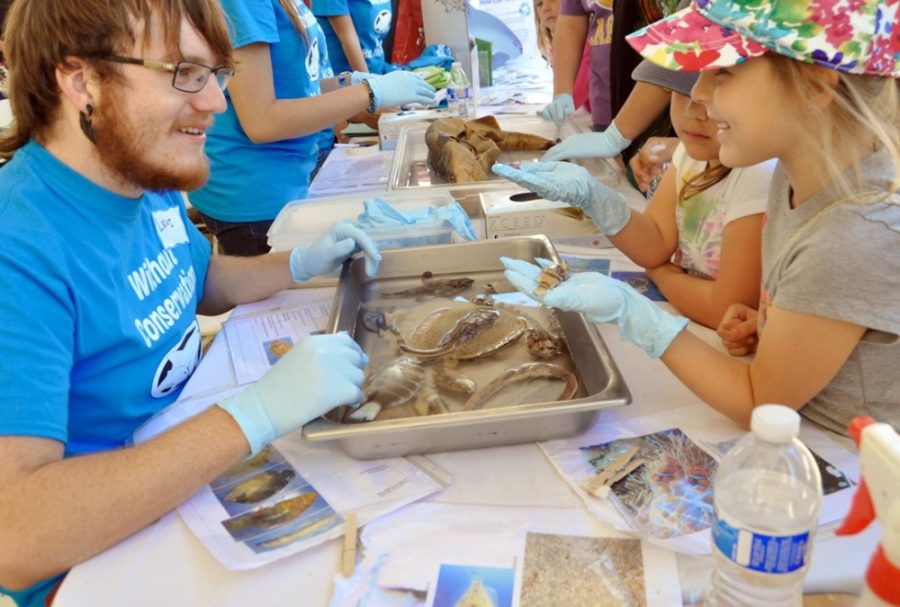If you thought the Tucson Festival of Books was only for bookworms, think again. This year’s Science City will feature physics lessons from a BMX rider, edible bugs, DIY probiotics and so much more.
“The whole Science City is an awesome opportunity for the community to come and talk with researchers that are doing cutting-edge research,” said Maria Schuchardt, the program coordinator at the Lunar and Planetary Laboratory and manager of the festival’s Science of Tomorrow tent.
Science City has been an important part of the festival for the past eight years because it promotes STEM (science, technology, engineering and mathematics) literacy among the community, said Erin Deely, the festival’s science stage liaison and director of recruitment and engagement in the College of Science.

There are six main “neighborhoods” of focus, as well as a Science Stage and Science Café, Deely said. Each neighborhood incorporates a different aspect of science, while the stage and café will be jam-packed with presentations from science authors and organizations during the festival.
The Arizona-Sonora Desert Museum will provide a live animal show on the Science Stage, Deely said. Both the stage and cafe will also host panelists from a variety of research areas and colleges.
“It’s a full schedule on both sides [the stage and the café],” Deely said. “It goes everywhere from space to the environment to women in science to campus bells and acoustics on the Mall; it’s this great offering.”
The event puts a special emphasis on hands-on science activities, hoping to engage people of every age, Schuchardt said.
Each area offers its own unique booths, experiments and demonstrations.
RELATED: Five science events not to miss during the Festival of Books
Science in Art
Science in Art, one of the newest additions to Science City, looks to show the public different ways that science and art can intersect, said Holly Brown, manager for the Science in Art tent and academic advisor in the department of physics in UA’s College of Science.
Some of the organizations that will be in attendance include the Arizona State Museum, Center for Creative Photography and Mini Time Machine Museum of Miniatures.
“A lot of people frame the sciences and arts as not necessarily enemies, but in competition, and I don’t believe that’s true,” Brown said. “I think that they work together and blend together and they’re just different ways that we can understand our world around us and express creativity in our knowledge.”
Brown said an exciting thing about this year’s event is that some of the university’s math clubs will be participating. One area these clubs will focus on is the relation between geometry and art.
Activities at the Science in Art tent will range from creating a miniature kaleidoscope to mixing color wheels.
Science of Food
If you find yourself getting hungry during the festival weekend, stop by the Science of Food tent for some mushrooms grown in pizza boxes or salad greens grown in water.
This year, the Science of Food tent will focus on new ideas in nutrition, new ways of food production and food safety, said Uwe Hilgert, tent manager and director of STEM training at the BIO5 Institute.
Aside from mushroom cultivation and aquaponics, visitors can also expect to see presentations on probiotics and edible bugs. Nutritional science and genomic research will also be a strong topic at the event this year, Hilgert said.
“I think that [seeing the] whole assortment of exhibitors that come from not-for-profit groups out in the community and university of research laboratories, and then connect that with something that is so everyday life as food is, is just an exciting contribution to the festival of books,” Hilgert said.
RELATED: Animal mascots: claws for a cause
Science of Tomorrow
Despite its name, you won’t want to wait another day before going to see this tent.
This year’s Science of Tomorrow tent is unique in that it will include more robotics, Schuchardt said.
Besides that, visitors will also have the opportunity to build paper rockets that actually launch, take a virtual reality tour of the Multiple Mirror Telescope Observatory, and look through a filtered telescope at the sun.

But wait—there’s more! Science City will also feature three other areas of scientific research and discovery, the Science of Everyday Life, Science of You and Science of the Natural World.
And Science City extends well beyond the big white tents on the Mall. Many buildings on campus, including the Flandrau Science Center and Planetarium, the College of Optics and the Laboratory of Tree Ring Research will open their doors to the public for tours and presentations, Deely said.
The Festival of Books is run entirely by volunteers, and Science City itself is no exception.
The 1,200 volunteers that work at Science City over the weekend are there because they share the same passion for science literacy, Deely said. Science City will be a part of the Festival of Books this weekend, March 11-12. A full list of all the events that will be going on can be found at sciencecity.arizona.edu/Events.
Follow Hannah Dahl on Twitter.









